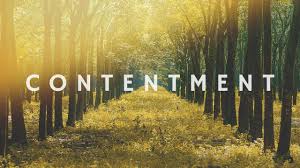
To listen to today’s reflection as a podcast, click here
Western culture, by and large, has embraced the premise that more is more.
More money, more property, more opportunity – contentment is always just one exciting moment away.
The problem is that more is never enough. A few years ago a corporate exec admitted, “We sell what nobody needs.” The problem, as many have observed, is that all of us need what nobody sells.
What we really need, in our heart of hearts, is God.
That inner hunger, however, masquerades as a deep longing for a bigger paycheck, a larger TV, happier kids, and a more compliant spouse. Brides and grooms promise to be there for each other “in sickness and in health, in plenty and in want, in joy and in sorrow.” But along the road to happily ever after, contentment often becomes increasingly elusive.
If only our luck changes. If only we had more in the bank. If only you didn’t leave your dirty clothes lying all over the place.
Why can’t we reshuffle the deck and start over again? Maybe we can inherit better circumstances.
Sorry, say most modern ethicists and philosophers. Your life, your chromosomes, and your circumstances are what they are. So deal with it.
Christianity’s earliest theologian, the apostle Paul, wouldn’t disagree. We can’t get a whole new life just because we’re exasperated with the one we’ve got.
But that doesn’t make us powerless. We can choose to understand and appreciate the life we’ve got in a fundamentally different way.
Here’s how Paul put it: “I’ve learned by now to be quite content whatever my circumstances. I’m just as happy with little as with much, with much as with little. I’ve found the recipe for being happy whether full or hungry, hands full or hands empty. Whatever I have, wherever I am, I can make it through anything in the One who makes me who I am” (Philippians 4:11-13, The Message).
We don’t need a different life. All we really need is for God to occupy the center of the life that we already have.
Author Philip Yancey tells about a spiritual leader who broke away from his busy schedule to spend a few days in a monastery. “I hope your stay is a blessed one,” said the monk who escorted him to his bare room. “If you need anything, let us know, and we’ll teach you how to live without it.”
That monk and the apostle Paul were clearly reading from the same script: Contentment isn’t something that happens to us. Contentment is a skill, an attitude, a way of thinking that can be learned.
Your present life, with all of its broken parts, is entirely capable of being incredibly blessed – even if you don’t end up getting more of what you’ve been hoping and praying to get more of.
Why is that so?
If your life is “locked into” the life of Jesus – by “believing into” his sacrificial death and resurrection – then all the spiritual assets associated with Jesus are automatically transferred to your account.
There’s an old story about a rabbi who visited a member of his flock in the hospital. The man felt overwhelmed by his problems. “My docs aren’t sure if they can do anything for me,” he sighed. “Well,” said the rabbi, “it could be worse.”
“Not only that,” the man went on, “my insurance provider told me this morning that because I accidentally missed my last payment, none of this is going to be covered.” “That’s awful,” admitted the rabbi. “But of course it could be worse.”
“On top of everything,” moaned the patient, “my wife just told me she doesn’t love me any more and is going to walk away.” The rabbi responded with deep sympathy, “I’m so very sorry. But, you know, it could be worse.”
That was more than the afflicted man could take. “Rabbi, would you mind telling me exactly how things could possibly be worse?”
There was a long pause, after which the rabbi said, “Well, it could have happened to me.”
In a world overwhelmed by disillusionment, suffering, and undeserved pain, Jesus said, “Let it happen to me.”
By willingly taking upon himself (and consequently paying off) the Global Cumulative Sin Deficit, Jesus has become the one faithful source of that for which every human being truly longs.
Authentic, lasting contentment.
